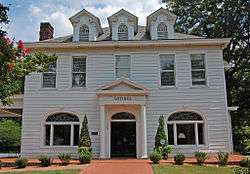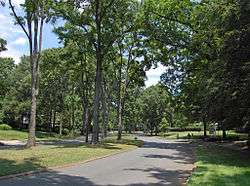Myers Park (Charlotte)
|
Myers Park Historic District | |
 Withers Building, Queens University campus, July 2007 | |
  | |
| Location | Roughly bounded by NC 16, E and W Queens Rd., and Lillington Ave., Charlotte, North Carolina |
|---|---|
| Coordinates | 35°11′33″N 80°49′59″W / 35.19250°N 80.83306°WCoordinates: 35°11′33″N 80°49′59″W / 35.19250°N 80.83306°W |
| Area | 597 acres (242 ha) |
| Architect | Nolen, John; Draper, E.S., Asbury, Louis |
| Architectural style | Colonial Revival, Bungalow/craftsman, Tudor Revival |
| NRHP Reference # | 87000655[1] |
| Added to NRHP | August 10, 1987 |
Myers Park is a neighborhood and historical district in Charlotte, North Carolina.
Though its boundaries originally coincided with the boundaries of the 1,220-acre (4.9 km2) John Spring Myers farm, the neighborhood, by 2008, comprised 2,200 acres (8.9 km2) and had a population of 9,809. Myers Park is bounded by Queens Road to the north; Providence Road to the east; Sharon Road to the south; and Park Road to the west.[2]
Neighborhoods that border Myers Park include Dilworth and Sedgefield to the west, Eastover to the east, Charlotte center city to the north, and South Park and Foxcroft to the south.
Myers Park is widely considered to be the most affluent and reputable neighborhood in the city of Charlotte.
History

Charlotteans today know the Myers Park neighborhood as one of the city's prestige addresses, an area of fine homes, tree-lined streets, and curving drives. Few realize that the neighborhood's importance extends far beyond Charlotte. Myers Park is of statewide significance because it was the home of many of the textile, banking, and utility leaders responsible for developing the Piedmont Carolinas into a major American manufacturing region in the early twentieth century.
John Springs Myers had already carved off part of his farm to create the Cherry neighborhood in 1891. His new dream was to turn the rest of his large cotton farm into an elegant suburb. He spent many evenings discussing the plan with his family and especially with his son-in-law, George Stephens. Stephens, who came to Charlotte after graduating from the University of North Carolina, joined the insurance firm of Walter Brem in 1896.
A talented businessman, Stephens was able to take advantage of the excellent opportunities that turn-of-the-century Charlotte provided, and he quickly became involved in several schemes. He and Brem joined realtor F.C. Abbott and textile banker B.D. Heath in developing part of Elizabeth, and in 1901, Stephens, Abbott, and Word H. Wood set up the Southern States Trust Company (which became NationsBank). In 1911, he founded the Stephens Company with Word Wood and A.J. Draper, and began to turn his father-in-law's dream into a reality. Moved by the same fashion consciousness as E.D. Latta, the company hired a city planner to make the plans. They chose John Nolen, whose design for Independence Park had impressed Stephens a great deal. It was a good choice, for Nolen later became one of the nation's top planners with over 400 projects to his name.
Nolen's vision for Myers Park was to use the natural curves, gentle hills, and creeks to create a secluded glen cut off from the city. A major boulevard would unite the whole and provide trolley service to homes scattered along winding side roads. The results earned Myers Park national acclaim as the "finest unified subdivision south of Baltimore." To the modern visitor, the New South Neighborhoods appear to have been constructed in the midst of a forest, but in fact this was not the case. It is hard to imagine those first years when it must have been plain to new residents that they were living on former cotton fields, and it was only hard work that changed the scenery. In Myers Park that work began in 1915, when Nolen hired the landscape architect Earle Sumner Draper to turn the almost treeless farmland into a suburban park. "Willow, oak, tulip poplar, and elm" were selected to grace the sidewalks and gardens. Early buyers even had their lots landscaped free of charge. Not a man to let nature take its own time, James B. Duke insisted that large trees be planted as well, and summoned one of his estate gardeners to oversee the task.
The history of Myers Park may be broken into three eras. First is its creation on the land of J. S. Myers under the direction of developer George Stephens, with the design guidance of John Nolen and Earle Sumner Draper. This era lasted from 1911 till Stephens' departure in 1922. The second period lasted from 1922 until 1935. Myers Park filled out, but some of Nolen and Draper's concepts were set aside, and the area developed with less green space and more small houses on small lots than they had envisioned. In the third era, from 1935 to the present, the professionally trained planners' ideas were totally forgotten as the neighborhood was completed. In the sixties much of the Nolen-designed area was even zoned for redevelopment, and only in the last few years have Nolen and Draper's contributions begun to be appreciated and safeguarded.
Myers Park Historic District
Myers Park Historic District is a national historic district located at Charlotte, Mecklenburg County, North Carolina. The district encompasses 670 contributing buildings, 4 contributing sites, and contributing structures in the planned streetcar suburb of Myers Park. It was developed after 1911 and includes notable examples of Bungalow / American Craftsman, Colonial Revival, and Tudor Revival style architecture. Located in the district is the separately listed James Buchanan Duke House. Other notable buildings include the John Jamison House (1912) and H.M. McAden House (1917) designed by noted architect Louis H. Asbury, five buildings dated to 1916 on the Queens College campus, Lambeth-Gossett House (1916), J. Luther Snyder House (1920), Myers Park Moravian Church (1924), Myers Park Presbyterian Church (1928), and Myers Park United Methodist Church (1929).[3]
It was added to the National Register of Historic Places in 1995.[1]
Demographics
Of the 9,809 people living in Myers Park in 2008, 2,249 were under 18 years of age; approx. 1,511 were over 64 years of age.[2] There were 4,643 housing units in Myers Park.[2] The median household income was $109,772.[2] The average house value in Myers Park was $778,762.[2]
Transportation infrastructure
Mass transit
The following buses from the Charlotte Area Transit System (CATS) serve Myers Park:
- #6 (Kings Drive)
- #14 (Providence Road)
- #15 (Randolph Road)
- #18 (Selwyn Avenue)
- #19 (Park Road)
- #20 (Queens/Sharon Road)
Roads
Providence Road, Kings Drive, and Queens Road are major thoroughfares in Myers Park. The highly confusing intersection of "Queens and Queens and Providence and Providence" in front of the Myers Park Library is legendary, as when traveling toward Uptown Charlotte on Providence Road, one must actually turn right at the intersection to stay on Providence, not go straight.
Education and libraries

School system
Residents of Myers Park attend Charlotte-Mecklenburg Schools, including Myers Park High School, Alexander Graham Middle School, Myers Park Traditional Elementary School, and Selwyn Elementary School.
Colleges and universities
Libraries
Myers Park is served by the Myers Park Branch of the Public Library of Charlotte and Mecklenburg County.[4] The library is located at the corner of Queens Road and Providence Road.
Sites of interest
- Theatre Charlotte - Charlotte's oldest arts organization and the state's longest running community theatre
- Manor Theatre - one of Charlotte's oldest movie theatres
- Duke Mansion - 400 Hermitage Road
- Edgehill Park
- Myers Park Baptist Church
- Little Church on the Lane - originally Myers Park Moravian Church
- Myers Park United Methodist Church
- Christ Church
- Myers Park Presbyterian Church
External links
| Wikivoyage has a travel guide for Charlotte/Myers Park. |
- Neighborhood Guide
- Charlotte-Mecklenburg Historic Landmarks Commission
- Myers Park Condos
- Myers Park branch of the Public Library of Charlotte and Mecklenburg County
- 2008 City of Charlotte and County of Mecklenburg Quality of Life Study: Myers Park
- Theatre Charlotte
- Dilworth - Neighborhood Master Hair Stylist
References
- 1 2 National Park Service (2010-07-09). "National Register Information System". National Register of Historic Places. National Park Service.
- 1 2 3 4 5 "2008 Neighborhood Quality of Life Study: Myers Park". charmeck.org Web Site. City of Charlotte and the County of Mecklenburg. Retrieved 2008-10-25.
- ↑ Mary Beth Gatza (August 1995). "Myers Park Historic District" (pdf). National Register of Historic Places - Nomination and Inventory. North Carolina State Historic Preservation Office. Retrieved 2015-02-01.
- ↑ "Myers Park branch of the Public Library of Charlotte and Mecklenburg County". Retrieved 2008-10-25.

